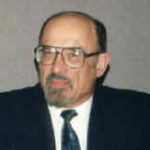 “I was born in Washington, D.C., June 13, 1931, of parents who immigrated from Russia (from a small village named Celtz near the Polish border) shortly after the first world war. Home was the inner city of Washington—a small apartment atop my parents’ grocery store on First and Seaton Street. During my childhood, Washington was a segregated city, and I lived in the midst of a poor, black neighborhood. Life on the streets was often perilous. Indoor reading was my refuge and, twice a week, I made the hazardous bicycle trek to the central library at seventh and K streets to stock up on supplies.
“I was born in Washington, D.C., June 13, 1931, of parents who immigrated from Russia (from a small village named Celtz near the Polish border) shortly after the first world war. Home was the inner city of Washington—a small apartment atop my parents’ grocery store on First and Seaton Street. During my childhood, Washington was a segregated city, and I lived in the midst of a poor, black neighborhood. Life on the streets was often perilous. Indoor reading was my refuge and, twice a week, I made the hazardous bicycle trek to the central library at seventh and K streets to stock up on supplies.
“No counseling or direction was available: my parents had virtually no secular education, never read books and were entirely consumed in the struggle for economic survival. My book choices were capricious, directed in part by the library architecture; the large, centrally placed bookcase on biography caught my attention early, and I spent an entire year going through that bookcase from A (John Adams) to Z (Zoroaster). But it was mainly in fiction where I found a refuge, an alternate, more satisfying world, a source of inspiration and wisdom. Sometime early in life I developed the notion—one which I have never relinquished—that writing a novel is the very finest thing a person can do.
“To the ghetto mentality of my day, career choices for young men were limited or perceived as limited. All of my peers either went into medical school or into business with their fathers. Medical school seemed closer to Tolstoy and Dostoyevsky, and I entered upon my medical training already having decided to go into psychiatry. Psychiatry. Then, in an effort to teach aspects of Existential Therapy I turned to a literary conveyance and in the past several years have written a book of therapy tales (Love’s Executioner), two teaching novels (When Nietzsche Wept and Lying on the Couch) and, my last book, Momma and the Meaning of Life (a collection of true and fictionalized tales of therapy).
“Though these books have been best sellers to a general audience and have been reviewed often—both favorably and unfavorably—on their literary merit (When Nietzsche Wept won the Commonwealth Gold Medal for best fiction of 1993), I intended them as pedagogical works—books of teaching stories and a new genre—the teaching novel. They have been widely translated—each into about fifteen to twenty languages—and have had considerable distribution abroad. When Nietzsche Wept, for example, was on the top of the Israeli best seller list for over four years. An anthology, The Yalom Reader, was published by Basic books at the end of 1997. In addition to key excerpts from each of my other books it contains several new personal essays which provide introductions for mental health professionals to Love’s Executioner, When Nietzsche Wept and Lying on the Couch. Currently I am working on a novel about Schopenhauer.
“My wife, Marilyn, received a Ph. D. in comparative literature (French and German) from Johns Hopkins and has had a highly successful career as a University Professor and writer (most recently A History of the Breast (Knopf) and is currently writing History of the Wife. My four Children, all living in San Francisco Bay area, have chosen a variety of careers—medicine, photography, creative writing, theater directing, clinical psychology. Five grandchildren and counting.”

 Meaning Conference 2025 will be the INPM’s first in-person conference with a virtual option after the pandemic.
Meaning Conference 2025 will be the INPM’s first in-person conference with a virtual option after the pandemic.